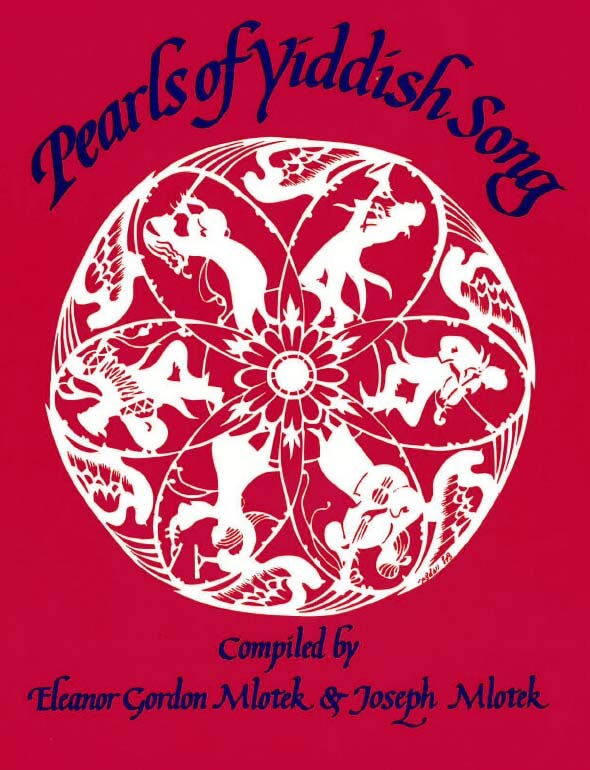Words by Yankele Brisker, pen name of Jacob Leiserowitz (1893-1985); music by Ziske Feigenbaum and J. Leiserowitz. Published in sheet music by J. Leiserowitz, N.Y., 1922. The song was revived in the Off-Broadway musical, The Golden Land (1982-87).

Oh, dear mother, you ask how I am, you ask what I’m doing in the golden land.
I can’t write you lies, my dear mother, and writing the truth makes my hand tremble.
I peddle and peddle from house to house; none is too far or too tall.
In heat and in cold, in wind and in rain, I drag myself, I run with my last bit of strength.
Oh, dear mother, I see here your face which is full of wrinkles and is so pale.
Here, dear mother, I see how you read my letter and how your old eyes become moist…
And your pale, dry lips murmur: — But it’s God’s will and all for the best.
I caresseed him, loved him, carried him in my arms. Now life takes and tramples him with its feet.
But, dear mother, don’t cry there, I beg you.
Dearer than gold is a single tear of yours.
I still hope, I still hope that God will help me and I won’t suffer so much anymore.
And, dearest mother, I’ll still bring you to me.
Oh God, how I want to live for that moment.
In the meantime, be well, my dear mother, and hope and trust, and don’t lose heart.
O, tayere mame, du fregst mikh vos makh ikh,
Du fregst vos ikh tu do in goldenem land.
Ikh kon dir nisht, mameshi, shraybn keyn lign,
Un shraybn dem emes, o, tsitert mayn hant. . .
Ikh pedl un pedl arum iber hayzer,
Nishto keyn tsu-vayt un nishto keyn tsu-hoykh.
In hitsn, in keltn, in vint un in regn
Men shlept zikh, men loyft mitn letst bisl koykh. . .
O, tayere mame, ikh ze do dayn ponem,
Vos iz ful mit kneytshn un iz azoy blas,
Ot, mameshl, ze ikh, du leyenst mayn brivl
Un s’vern di altitshke oygn bald nas. . .
Un s’sheptshen di bleykhe, di trukene lipn:
— Es iz dokh gots rotsn tsum gutn gevis;
Getsertlt, gelibt; oyf di hent im getrogn,
Itst nemt im dos lebn un tret mit di fis. . .
Nor, tayere mame, nisht veyn dort, ikh bet dikh,
S’iz tay’rer fun gold mir dayn eyntsike trer,
Ikh hof nokh, ikh hof nokh, az got vet mir helfn
Un ikh vel nisht plogn zikh mer azoy shver.
Un ikh vel dikh, mameshi, nemen tsu mir nokh,
O, got, vi derlebt men shoyn yene minut!
Dervayl zay gezunt dort, mayn tayere mame,
Un hof dort un gleyb un farlir nisht dem mut. . .
אָ, טײַערע מאַמע, דו פֿרעגסט מיך װאָס מאַך איך,
דו פֿרעגסט װאָס איך טו דאָ אין גאָלדענעם לאַנד,
איך קאָן דיר נישט, מאַמעשי, שרײַבן קײן ליגן,
און שרײַבן דעם אמת, אָ, ציטערט מײַן האַנט. . .
איך פּעדל און פּעדל אַרום איבער הײַזער,
נישטאָ קײן צו־װײַט און נישטאָ קײן צו־הױך,
אין היצן, אין קעלטן, אין װינט און אין רעגן
מען שלעפּט זיך, מען לױפֿט מיטן לעצט ביסל כּוח. . .
אָ טײַערע מאַמע, איך זע דאָ דײַן פּנים,
װאָס איז פֿול מיט קנײטשן און איז אַזױ בלאַס,
אָט, מאַמעשי, זע איך, דו לײענסט מײַן בריװל
און ס’װערן די אַלטיטשקע אױגן באַלד נאָס. . .
און ס’שעפּטשען די בלײכע, די טרוקענע ליפּן:
— עס איז דאָך גאָטס רצון צום גוטן געװיס;
געצערטלט, געליבט, אױף די הענט אים געטראָגן,
איצט נעמט אים דאָס לעבן און טרעט מיט די פֿיס. . .
נאָר, טײַערע מאַמע, נישט װײן דאָרט, איך בעט דיך,
ס’איז טײַ’רער פֿון גאָלד מיר דײַן אײנציקע טרער,
איך האָף נאָך, איך האָף נאָך, אַז גאָט װעט מיר העלפֿן
און איך װעל נישט פּלאָגן זיך מער אַזױ שװער.
און איך װעל דיך, מאַמעשי, נעמען צו מיר נאָך,
אָ, גאָט, װי דערלעבט מען שױן יענע מינוט!
דערװײַל זײַ געזונט דאָרט, מײַן טײַערע מאַמע,
און האָף דאָרט און גלײב און פֿאַרליר נישט דעם מוט. . .
Song Title: Dem Pedlers Brivele

First published in 1988 as Pearls of Yiddish Song: Favorite Folk, Art and Theatre Songs, this anthology contains 115 songs. Some material had never been published, while others, included in rare song collections or sheet music, were largely inaccessible. The songs presented reflect Jewish life in Eastern Europe and the United States and depict childhood, love, family celebrations, poverty, work and struggle. There are also songs from the Hasidic and Maskilic movements, songs of Zion and of America, as well as songs from the Yiddish theater.
The title of this anthology derives from the weekly two-page feature column “Pearls of Yiddish Poetry,” which the compilers Yosl and Chana Mlotek initiated in 1970 in the Yiddish newspaper Der Forvertz (the Yiddish Daily Forward). Hundreds of readers from around the world — including authors, composers, singers, actors — became co-participants in this collective folk project and recalled melodies, lines, fragments, stanzas and their variants of songs, poems, and plays which they had heard in their youth. At first, readers sent in only written material. Later, they also taped songs on cassettes, many of whose melodies had, until then, never been recorded. They also identified and supplied missing information regarding lyricists, poets, and composers and described the circumstances surrounding the songs’ origins, their dissemination, diffusion and impact.